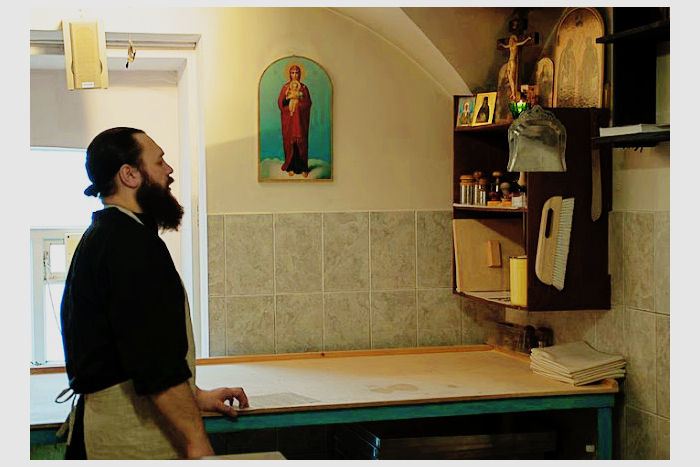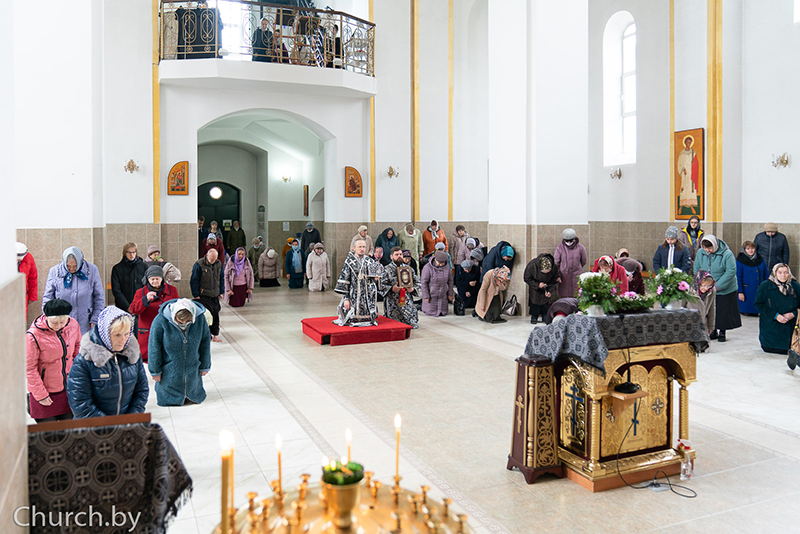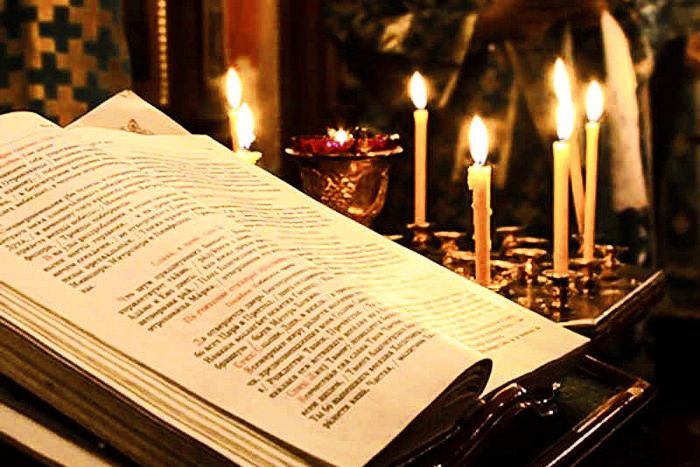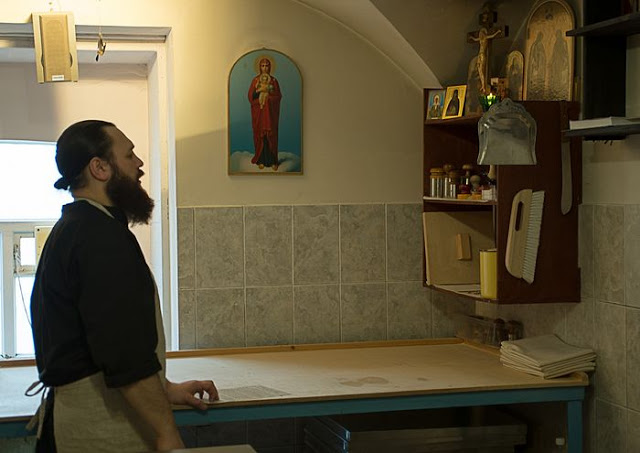
Everything that happens should lead us to God and say, “Nothing happens without God’s will; God knows what is good and profitable, and that is why it happens as it does.” — Abba Dorotheos
The orchards of Valaam… So much has been said and written about them. But the flood continues of exclamations and puzzled questions about how people can grow vegetables and exotic fruits in conditions described as “extremely high-risk agricultural”, and even produce amazingly abundant harvests. What is the secret? Do the Valaam monks know something that is hidden from the rest of the world? What gives them the strength to transform nature and create with their hands paradisal foliage on bare rocks?
Growing potatoes, making cheese, and farming trout are all vitally important, but not the most important thing for monks. As opposed to strong collective farms and agribusinesses, the brothers’ agricultural obediences have, to use modern language, different ideological foundations—nothing in the monastery is done without prayer and hope in God’s will, and everything is directed toward the acquisition of humility and peace of soul.
“Thy will be done, on earth as it is in heaven.”
A believing person lives with the thought that God watches after each of us, just as each of the five sparrows sold for two farthings, and firmly remembers the Gospel words, Fear not therefore: ye are of more value than many sparrows (Lk. 12:7). The true Christian, and especially the monk, firmly knows and is sure that his earthly life belongs completely to the Creator: As the Lord lives, there shall not fall to the ground one of the hairs of his head (1 Kings 14:45). In the New Testament is written, Are not two sparrows sold for a farthing? and one of them shall not fall on the ground without your Father. But the very hairs of your head are all numbered. Fear ye not therefore, ye are of more value than many sparrows (Matt. 10:29-31). Without His will, not even a hair can fall from our head (cf. Lk. 21:18).
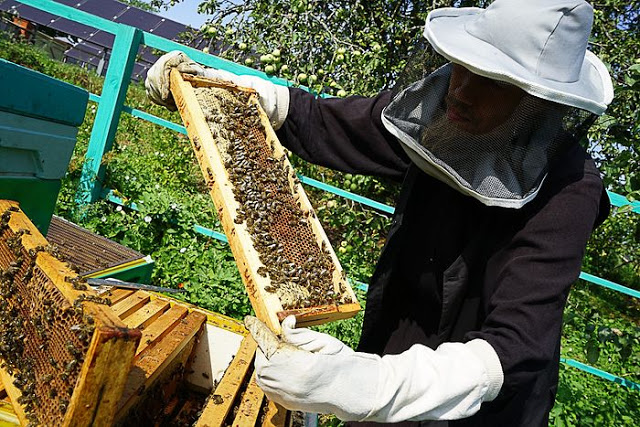
It is better not to lose the seven-eighths in order to preserve the one-eighth
Even a person who is distant from the Church has thousands of proofs that there are times when all goes not as calculated or planned; sooner or later something happens to clearly prove that it is illusion and self-deception to be sure that all plans are carried out with total control over the situation. That is why a believer always asks in prayer for God’s blessing and help before beginning every work. This hope not in oneself but in the Heavenly Father grants us unselfish joy in even the smallest victory, and gives us the strength with humility to accept defeat—even very great defeat. And this applies to any work, be it painting icons, or growing grapes on rocks and pineapples in a greenhouse.
However, prayer alone will not save us; it has to be joined with the fulfillment of God’s will—everything that is placed upon each of us in our everyday lives. In the sweat of thy face shalt thou eat bread (Gen. 3:19); some teach children, some build houses, sew shoes, or conduct a train. Valaam monks always had to obtain their daily bread through labor; after all, nothing about the nature and climactic conditions on the archipelago offered any hope of an easy life. No, there was never an easy life on the island even during the most favorable years. And tragic events in the monastery’s history are countless. Each time the brothers had to raise the monastery from ruins, carefully restoring and preserving the former and creating the new. It is not possible to walk this hard path without peace in the soul—A sacrifice to God is a broken spirit, a heart that is broken and humbled, God will not despise (Ps. 50:19).
As in centuries and decades ago, behind every church or skete built, or every tomato grown in the greenhouse, are everyday obediences. It is hard for a layperson to believe that the monk cutting the hay or milking the cow has a good university education, but is now joyfully and lightheartedly “spinning the cow’s tail” in a monastery. And what is most amazing is that the labors of these former city-dwellers bring forth a wide array of tangible fruits.
We repeat: Every work that a believer begins should have God’s blessing. But this blessing does not visit the stiff-necked and self-willed, but only the humble and meek. In Abba Dorotheos’s Instructions we read, “Thus, if you are doing any kind of work and wish to fulfill it completely and entirely, then strive to fulfill the work itself, which as I have said, is the eighth part of what is sought, and at the same time preserve your own state of soul unharmed, which constitutes seven-eighths. But if fulfilling your work, your service becomes distracted and you depart from the commandments and harming yourself or another by quarrelling, then it is better not to lose the seven-eighths in order to preserve the one-eighth.”
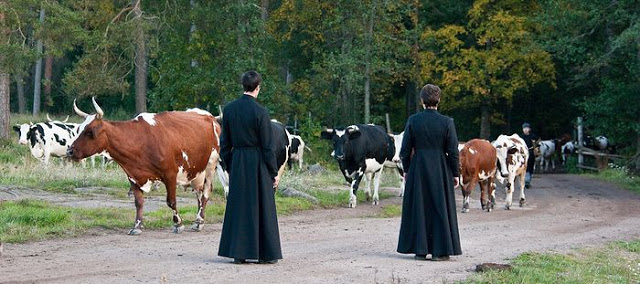
Then with a pure heart we fall down in prayer to the Lord, so that we would not depart in anything from His holy will, and that He would give us the strength to overcome difficulties. And whoever has the zeal to fulfill God’s will in everything will have bolder prayer before God.
Prayer is not a spell but a request for help
Thus, every work begins with a prayer to the Lord. In the Orthodox Church it is customary to turn in prayer to the Holy Spirit. We can pray briefly, “O Lord, bless!” But it is better not to be lazy, and spend a little time calling out for God’s help. It is good to learn these prayers by heart and repeat them to ourselves when necessary.
Having prayed before the beginning of a new work, we should complete it honestly and wholeheartedly. After all, prayer is not a spell but a request for help, andthe saints will not do anything without our participation. Prayer gives us strength, but it doesn’t do away with the need to do what’s required of us in the best way possible. Even the apostles earned their own living, and endured want, heat, and cold.
After finishing the workday or completing a job, we mustn’t forget to give thanks for the help received. After all, in everyday life the words, “thank you”, are the norm. Giving thanks helps us also avoid such sins as pride. Otherwise, one might decide to ascribe success to his own strength, and this is not far from catastrophe.
Giving thanks for something good rendered is necessary, even if it didn’t all turn out exactly as we would have liked it to—after all, every God-pleasing work is simply bound to be successful. This is the very testimony of the Valaam orchards, blossoming and bearing fruit despite the climate, poor soil, and decades of neglect.
The teacher and instructor of monks, Abba Dorotheus, writes, “No matter what, I always do what I can according to my strength and render it all to God.” And, “Humility consists in ascribing your labors to God.” Isn’t this the secret of Valaam’s paradisal greenery? Isn’t this also the secret to a happy life in the world—in perfect humility, hope in God, and in a peaceful, joyful heart?
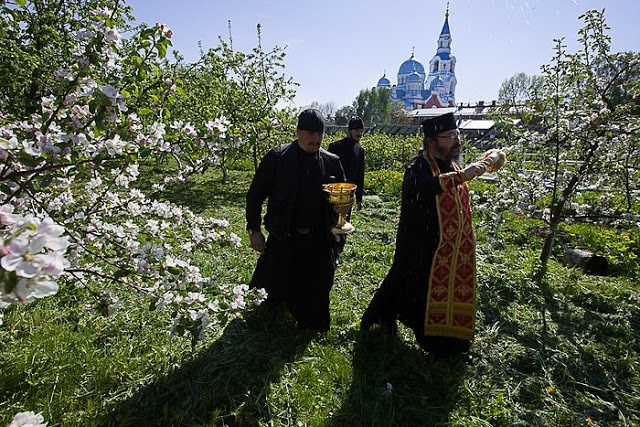
Prayer at the Commencement of Any Work
Though the prayers of our holy fathers, O Lord Jesus Christ, our God, have mercy on us. Amen.
Heavenly King, Comforter, Spirit of Truth, Who art everywhere present and fillest all things, Treasury of good gifts and Giver of Life, come and abide in us, and cleanse us of all impurity, and save our souls, O Good One.
Holy God, Holy Mighty, Holy Immortal One, have mercy on us. (thrice)
Glory to the Father, and to the Son, and to the Holy Spirit, now and ever, and to the ages of ages. Amen.
Most Holy Trinity, have mercy on us. O Lord, wash away our sins, O Master, pardon our transgressions. O Holy One, visit and heal our infirmities, for Thy Name’s sake.
Lord, have mercy. (3 times.)
Glory to the Father, and to the Son and to the Holy Spirit, now and ever, and to the ages of ages. Amen.
Our Father, Who art in heaven, hallowed be Thy Name. Thy Kingdom come. Thy will be done, on earth as it is in heaven. Give us this day our daily bread. And forgive us our debts as we forgive our debtors. And lead us not into temptation, but deliver us from the evil one.
O Lord Jesus Christ, Only-begotten Son of Thy Eternal Father, Thou hast said with Thy most holy lips: “Without Me, you can do nothing.” My Lord and my God, in faith I embrace Thy words with my heart and soul, and bow before Thy goodness; help me, a sinner, to do in union with Thee this work which I am about to begin, in the Name of the Father, and of the Son, and of the Holy Spirit. Amen.
Prayer After the Completion of Any Work
Glory, both now.
Thou, O my Christ, art the sum and fullness of all that is good; fill my soul with joy and gladness, and save me, for Thou alone art all-merciful. Amen.
It is truly meet to bless Thee O Theotokos, ever blessed and most blameless and Mother of our God. More honorable than the cherubim, and beyond compare more glorious than the seraphim, who without corruption gaveth birth the God the Word, the very Theotokos, Thee do we magnify.
Glory to the Father, and to the Son, and to the Holy Spirit, now and ever, and to the ages of ages. Amen.
Lord, have mercy. (3 times.)
Dismissal:O Lord Jesus Christ, Son of God, through the prayers of Thy most pure Mother, our holy and God-bearing fathers, and all the saints, have mercy on us. Amen.

Before the beginning of the workday, we can pray to the saints:
To the Mother of God, the intercessor for all mankind.
To our guardian angel; he is called to protect our body from illness, and our soul from temptation. But we mustn’t forget that bad thoughts and deeds make angels leave us.
To the saint whose name we were given at holy Baptism.
To Saint Nicholas, who was also a zealous laborer, and always helped his neighbor no matter how hard it was.
To St. Triphon, who always helps people fulfill their duties well; and to other favorite saints.
This article was prepared through the efforts of the brothers of Valaam Monastery, and their website volunteer, Natalia Rogozhina.
Translated by Nun Cornelia (Rees)

